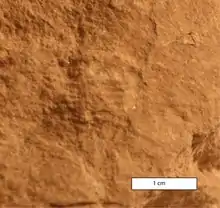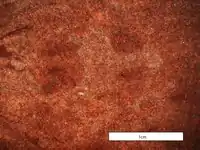Erytholus
Erytholus is a form genus for problematic fossils of Cambrian age in South Australia. It has been of special interest because of its morphological similarity with the Ediacaran fossil Ventogyrus, and may have been a late surviving vendobiont. It could be a slime mold.[1]
| Erytholus Temporal range: | |
|---|---|
 | |
| Crack-out specimen of Erytholus globosus from the Middle Cambrian, Moodlatana Formation, of the Flinders ranges, South Australia | |
| Scientific classification | |
| Kingdom: | |
| Genus: | †Erytholus Retallack 2011 |
| Species | |
| |

Specimen of Eryhtolus globosus in sandstone slab cut vertical to bedding

Sketches of specimens of Erytholus globosus from the Middle Cambrian, Moodlatana Formation of the Flinders Ranges, South Australia
Description
Erytholus is a globose, chambered fossil, with associated vertical tubular structures. Its preservation in sandstone is similar to the Ediacaran type preservation of the vendobiont Ventogyrus. It is found at depths of 20–30 centimetres (7.9–11.8 in) within paleosols. Its affinities are uncertain, although it bears a general resemblance to truffles.[1]
References
- Retallack, G.J. (2011). "Problematic megafossils in Cambrian paleosols of South Australia". Palaeontology. 54 (6): 1223–1242. Bibcode:2011Palgy..54.1223R. doi:10.1111/j.1475-4983.2011.01099.x. S2CID 130692406.
This article is issued from Wikipedia. The text is licensed under Creative Commons - Attribution - Sharealike. Additional terms may apply for the media files.